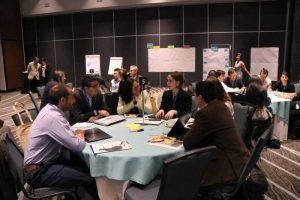
17/04/2018
EUROCLIMA+ and Cooperación Sur-Sur Evaluación, programmes funded by the European Union, unite to bolster the region’s climate policies
19/03/2018
Mexico City hosted the first Workshop on Monitoring and Assessing Climate Change Adaptation and Mitigation Policies, a regional meeting in which experts on public policy and climate change assessment worked together to improve Latin American climate policies.
Some 70 participants from 17 Latin American countries attended the event organised by the Climate Governance component of the Euroclima+ programme, which offers support to the region on climate change issues, and Cooperación Sur-Sur , which promotes the assessment of public policies in Latin American and the Caribbean. Both of these programmes are managed by FIIAPP with funding from the European Union.
 The regional meeting was divided into three days with different sessions exploring how to articulate the monitoring and assessment of climate policies, their relationship with the SDGs and the role of civil society in this policy area. It also fostered an exchange of experiences among the representatives from Latin American countries, European institutions and the United Nations.
The regional meeting was divided into three days with different sessions exploring how to articulate the monitoring and assessment of climate policies, their relationship with the SDGs and the role of civil society in this policy area. It also fostered an exchange of experiences among the representatives from Latin American countries, European institutions and the United Nations.
At the opening ceremony, the director of FIIAPP, Pedro Flores, emphasised the importance of collaboration between the various EU cooperation programmes in Mexico, the Mexican Agency for International Development Cooperation (AMEXCID), the Secretariat for the Environment and Natural Resources (SEMARNAT), the National Institute of Ecology and Climate Change (INECC) and the National Council for the Evaluation of Social Development Policy (CONEVAL).
The event also received support and assistance from the EUROsociAL+ Programme in the discussions on the importance of public policies in tackling the effects of climate change on vulnerable sections of the population and, in particular, their impact on the inequality gap in the Latin American region.
The practice of monitoring and assessing climate change policies is relatively new. However, there are already useful proposals for linking the two areas in order to take action in the future. The workshop will also promote interinstitutional coordination and the creation of channels of communication.
Summary of the event: